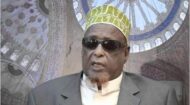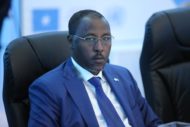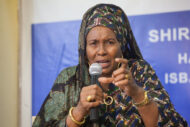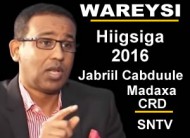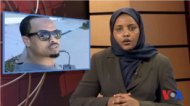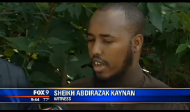

With 80 percent of ballots counted, Mr. Putin had won 64.7 percent of the vote, the Central Election Commission said, comfortably above the 50 percent needed to avoid a runoff and extending his claim on power to 18 years, which would equal the rule of Leonid Brezhnev, the Soviet leader for much of the cold war. “We have won!” Mr. Putin, tears streaming down his right cheek, told a throng of tens of thousands of his supporters on Manezh Square, just outside the Kremlin walls.
“We have gained a clean victory!” he said, standing next to Dmitri A. Medvedev, the protégé he chose to succeed him as president just over four years ago, and who now, in a job swap, has been promised the post of prime minister. “We won!” Mr. Putin said. “Glory to Russia!”
Amid renewed allegations of voting fraud, some opposition leaders called for demonstrations beyond those allowed by government permits, raising the prospect of a sharp response from the authorities and threatening to undercut Mr. Putin’s promise of stability.
“This is not an election; it’s a shame,” Sergei Udaltsov, the leader of the Left Front, a radical socialist group, posted on Twitter. “Once again they spat in our face. Tomorrow we go to the streets!”
Despite their strength in numbers, the protests have failed to yield clear leaders, nor have they spread much beyond the capital, which raises questions about the opposition’s viability.
The popular anticorruption blogger Aleksei Navalny said he would lead an unsanctioned march to the Kremlin after Monday’s rally, and he has called for a permanent encampment of demonstrators like those created by the Occupy movements in the West.
“People need to go out on the streets and not leave until their demands are met,” he said in a television interview.
In an echo of the disputed parliamentary election in December that helped set off the huge opposition protests, there were, by some tallies, more than 3,000 complaints of voting violations. They included “carousel voting,” in which the same people cast ballots at multiple locations, and “centralized voting” in which managers of factories, schools, hospitals and other large organizations pressure employees to vote for a specific candidate. In some cases, ballots are collected at the workplace.
And once again there were statistically improbable results from the North Caucasus, home to 6 percent of the Russian electorate. Mr. Putin and his party have previously won close to 100 percent of the vote there, with abnormally high turnout.
Thousands of election observers took up posts across the country, most of them — in accordance with Russian election law — aligned with a candidate. In response to citizens’ cellphone photographs and video documentation of fraud in December, the chairman of the Central Election Commission, Vladimir Y. Churov, announced that 180,000 Web cameras — installed at a cost of $450 million — would be used to record activity inside polling stations in real time and turned off “only after the counting of votes and the final signing of the protocols.”
But Gennady A. Zyuganov, the Communist Party presidential candidate who finished a distant second, said the vote was tainted.
“It was illegitimate, unfair and not transparent,” he said. However, there was no expectation that the complaints or the statistical anomalies would change the outcome.
Many voters said that they remained ambivalent. “I will not say who I am voting for,” Anastasia Ryabukhina, 20, a student at the Academy of Labor and Social Relations, said at a polling station in southwest Moscow. “But think about it yourself: of all of them, Putin is the most realistic candidate.”
Natalia I. Bazlova, 57, who voted at a school in the historic Cheremushki district, said: “I share his views but looking at his rivals, I also don’t see any other option. He is the most reliable. Putin is our stability.”
Mr. Putin’s victory never seemed in doubt. He faced three, well-worn opponents whom he had defeated in previous elections — including Mr. Zyuganov — and one newcomer, Mikhail D. Prokhorov, a billionaire industrialist and owner of the New Jersey Nets basketball team, who mustered the two million signatures to get on the ballot but had no party to support him and no political experience.
Mr. Zyuganov, 67, was running for the fourth time, and Vladimir V. Zhirinovsky, 65, the leader of a nationalist party, was in his fifth race. Sergei M. Mironov, 59, of the Just Russia Party, ran against Mr. Putin in 2004 while simultaneously saying that Mr. Putin deserved to be re-elected.
Dmitry Korotayev/Getty Images
Russian soldiers waited their turn to vote at a polling station in Moscow on Sunday. More Photos »
Multimedia
The opposition’s ability to mount mass protests helped make the political playing field Russia’s most unstable since 1996, when President Boris N. Yeltsin was forced into a runoff vote by Mr. Zyuganov, the Communist leader.
Ahead of the vote, the country had seemed on edge. On Saturday, Danila Lindele, an opposition journalist, posted this on Twitter: “A feeling that tomorrow is the end of the world.”
On Sunday, as is usual on Election Day here, tens of thousands of police officers were mobilized in a show of order and security.
A 24-year-old man at a polling station in Moscow, who declined to give his name, said that he worked at the Emergency Services Ministry and that he was compelled by his supervisors both to vote for Mr. Putin and to work as an election observer on behalf of his campaign.
“The old people come and the old people come and the old people come and all vote for one candidate — for Putin,” he said. “Why are they voting for Putin? Watch TV. There is one face: Putin.” He added, “If I could, I myself would have voted for Prokhorov.”
Tatiana Chernova, 36, the director of a bank office, voted for Mr. Putin. “We know what we can expect from him,” she said.
So did Tatiana Zorina, 59, who collects a pension but still works. “He is stable,” she said of Mr. Putin. “Life has become a little better. My pension has risen — not much, but it has risen.” She added, “People like him. They know that with him, we shall live as we lived before.”
Even as the votes were still being counted, there were signs that Mr. Putin may have less tolerance for the opposition protests going forward.
“We have won in an open and fair struggle,” he said at his victory rally. “But this was not only the election of president of Russia, this was a very important test for all of us, for our entire people. This was a test for political maturity, for independence.” He said the result showed Russian voters would not fall for “political provocations.”
One of Mr. Putin’s supporters, Irina Yarovaya, the chairwoman of the security committee in Parliament, called the opposition “provocateurs and traitors.”
“We were threatened with an Arab Spring,” she told the crowd. “But we will have our own spring. We will not submit to the will of strangers.”
She clearly was not thinking of Sergei N. Tanikov, 57, a retired lieutenant colonel in the K.G.B., who said he intended to join the protest on Monday evening.
“Today nothing will be decided,” Mr. Tanikov said outside a polling station in Moscow, where he planned to vote for Mr. Zyuganov. “I have never participated in a protest, but tomorrow I will go out because I can no longer tolerate this fascist regime.”
Reporting was contributed by Glenn Kates, Anastasia Sadovskaya, Michael Schwirtz, Olga Slobodchikova and Anna Tikhomirova from Moscow, and Andrew E. Kramer from Grozny, Russia.

 All Posts
All Posts




